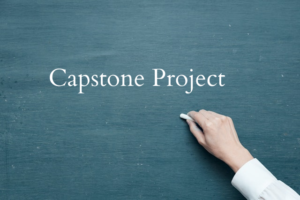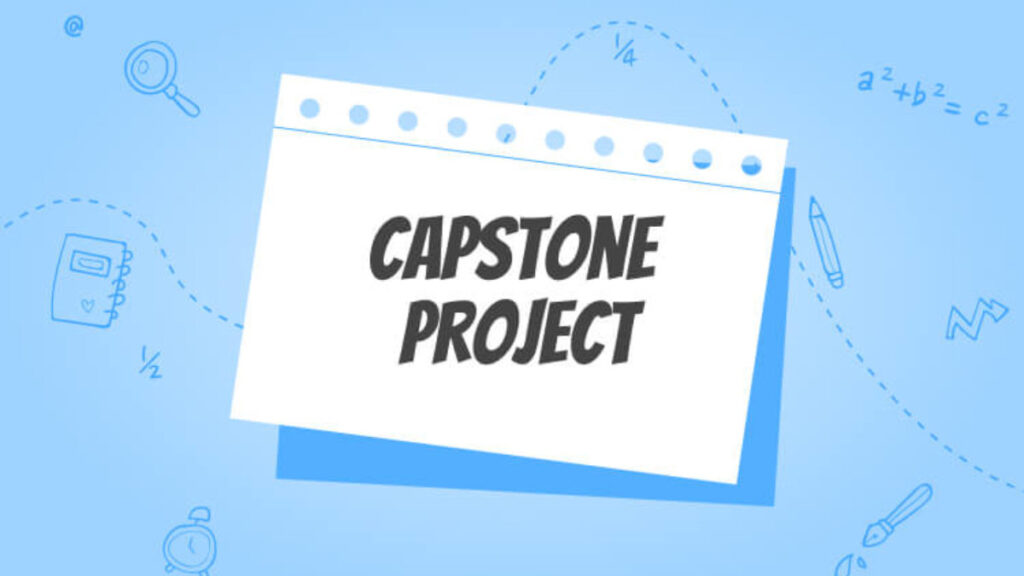How To Write A Capstone Project
A capstone project is a comprehensive paper that reflects a student’s learning journey. It showcases the knowledge, abilities, and expertise gained throughout the program. This academic work is typically completed during the final year of high school, middle school, or as a requirement in a university course. For the capstone project to be valid, it should gather all the skills the student has learned from multiple subjects and result in a final paper that shows what the student has understood in their degree program. Its unique element is that it should propose a specific problem and provide a solution.
It can be assigned to students doing courses like IT, nursing, business, and engineering, and can be presented in different forms such as surveys, case studies, focus groups, research papers, and outcome-based evaluation. The paper’s complexity and type will be dependent on the requirements of your tutor and your course. Its length is approximately forty pages or more, depending on your instructor’s requirements, and you will have lots of time to work on your project.
 As a preliminary step, when preparing to write, you should choose from the many capstone project ideas related to your course. You should know that the project will be connected with your future specialization. To write a good paper, you should have strong critical and analytical thinking, teamwork, and public speaking skills.
As a preliminary step, when preparing to write, you should choose from the many capstone project ideas related to your course. You should know that the project will be connected with your future specialization. To write a good paper, you should have strong critical and analytical thinking, teamwork, and public speaking skills.
Writing a capstone project is important for individuals who have studied for many years in a specific academic program and need to show they are professionals. Apart from writing this academic paper, you will also be required to defend it. Defending involves presenting your project of improving students’ skills in public speaking and helping them clearly express their ideas and thoughts. Along with the defense, you will need to have a project portfolio with additional materials to help your listener know how you came to your conclusions. Writing a capstone project can be made much easier if you read the step-by-step guide outlined in this article.
Guides on How To Write A Capstone Project
- Think of your topic: Think about the topic you want to write on from the start of the program. You should write down the ideas that come to your mind during the classes, especially on topics that interest you and seem manageable. It is advisable to focus on topics that will give you a chance to demonstrate your knowledge of the discipline. Remember that capstone projects highlight the skills and knowledge gained by the students during their study and how they can be applied in a potential workplace.
- Create the project’s proposal: A proposal should be submitted to your instructor before you begin the capstone project. Ensure your proposal has everything that will convince the reader you are interested in the selected topic. It should include the following crucial points:
- Mention the topic you have chosen and why you want to write about it.
- Write about the experience you have in that topic.
- Say the research you intend to carry out in your paper and the methods you plan to utilize.
- Have a list of the required human subject approvals and workplace.
- State the objectives you want to achieve with your project.
- Gather information: Identifying relevant sources and searching for information related to your topic is a critical step. Search through your course textbooks as they usually have lists of recommended literature that can be used for your project. Save all the sources and links related to your subject in a folder on your computer.
- Structure your paper: Different capstone projects have different formats. With a clear structure, you will logically divide your paper into sections and write each part effectively. A typical capstone project’s structure has a title page, introduction, literature review, methods, results and discussion, conclusion, recommendations, and references list. These sections have been discussed in detail later in the article.
- Make a timetable: A capstone is a voluminous paper; therefore, you need to plan your time well. You should create a calendar with the tasks you should do regarding the project and deadlines. Keep correcting the calendar as you complete the tasks.
- Make a timetable: A capstone is a voluminous paper; therefore, you need to plan your time well. You should create a calendar with the tasks you should do regarding the project and deadlines. Keep correcting the calendar as you complete the tasks.
- Start the writing process: The thesis statement is the basis of your project. Develop a solid, specific, and narrow thesis statement. A broad thesis will make it impossible for you to cover all the details of your research. You can start writing your capstone project from any point, but be sure to write the introduction last. The introduction chapter should contextualize your problem and provide the rationale for your research. You will write an engaging introduction once you have in-depth details of your research. After writing the introduction, you should describe the problem. Clearly define the problem to give your readers an idea of what you will discuss on the project. Highlight the study’s objectives and the problem’s nature and emphasize how your research will address it. The literature review section should summarize the findings of the existing literature on the topic. Briefly analyze the sources relevant to your topic and make an overall conclusion in this part. Take note of the gaps in the literature and use quotes to increase your review’s value.
In the methods chapter, you should analyze your research processes. Make the reader how you collected, analyzed, and evaluate data. You should justify your choice of methods and outline the positive and negative sides of the selected methods. The results part should describe the results you collected during the study. Include tables and charts in your capstone project to enable the reader to visualize the data. Carry out data interpretation in this part too. The conclusion chapter should summarize your project’s findings and recommendations for further applications and research. You should also give the connection between your findings and the research problem.
- Proofread your paper: Before submitting the paper to your tutor, you should proofread it. Reread the write-up to ensure all the sections are complete and logically correct. You should remove statements that do not have meaning and correct typos and incorrect grammar. Make sure your paper has an academic tone, and format it according to the guidelines provided.
If this were a question about our capstone project writing services, we would confidently say we provide any help you may need. Whether it’s writing individual chapters or abstracts or comprehensive support from choosing a project topic to defending it. You will be pleasantly surprised when you study the advanced order form options. Here, you can buy a capstone project of any complexity for any academic level while setting any deadline and specifications.
Get a 15% Discount on Your First Order!

